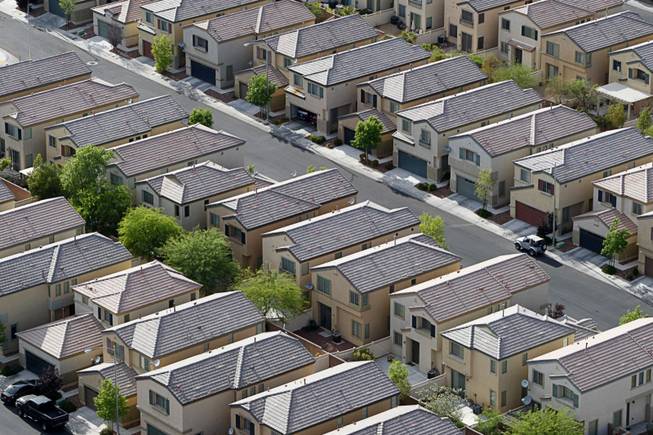
An aerial view of homes in the southwest part of the Las Vegas Valley taken from a helicopter May 21, 2012.
Wednesday, Feb. 27, 2013 | 2 a.m.
Your property taxes could increase under a bill before the Nevada Legislature aimed at changing the state's property tax structure.
But the bill does not call for a straight rate increase.
Here’s how and why your bill could change:
As a house ages, the state gives property owners a 1.5 percent discount every year until a property is 50 years old. This is called “depreciation.”
It compounds, so every year for 50 years a property owner gets an increasing discount.
The bill in the Legislature would lower that rate to 1 percent for new homes and improvements to existing property, meaning the effective tax rate paid by property owners wouldn’t drop as quickly each year.
The winners in this scenario are the state’s school districts, counties and cities, the primary recipients of property tax revenues.
The losers, some who testified at a hearing Tuesday, would be the homeowners footing a slightly higher tax bill than they would have if the change hadn’t been made.
Decreasing the rate would amount to an average property tax increase of 0.28 percent for all properties in Clark County when using data from 2011-12, Jeremy Aguero, analyst with Applied Analysis, said in a presentation to the Assembly Taxation committee.
A property would still get the full discount, but it would take 75 years instead of 50 years to get there.
Confused?
“We have the most complicated tax system for property in the United States,” said Carole Villardo, president of the Nevada Taxpayers Association. “When I try to explain how we derive a (property) tax bill over the phone, I can almost see somebody’s eyes glaze over.”
Nevada is the only state that uses a depreciation rate for property taxes.
The practical effect is that two neighbors with the same acreage and same model of home — one built 50 years ago and one built one year ago — can receive a dramatically different property tax bill.
That’s because the older property has a 75 percent depreciation discount compared to no discount for the newer property.
Granted, inflation and rising home values still can produce an annual dollar-over-dollar increase in property taxes for both properties, but one homeowner would essentially get a bigger discount than the other.
One man testifying at a legislative hearing on the bill said that’s the equivalent of driving to McDonald’s, watching a neighbor pay $0.25 for a cheeseburger and then paying $1 for a cheeseburger yourself.
Furthermore, the same two neighbors who send their kids to the same school, drive on the same county roads, use the same library and access the same city sewer lines pay disparate costs for the same services, he argued.
“The system of taxation in this state is broke,” said William Birke, a private citizen testifying before the Legislature. “We all use the same city services and state services. Every resident should pay the same tax.”
This bill would not fix that inequity.
The Legislature first created the discount rate in 1981 and set the rate at 2 percent.
“It was because of the concern that individual residents who stayed in their properties for any length of time, with the increasing (property) values, would have a harder time finding the money to repair those properties,” Villardo said.
The Legislature then lowered the rate to 1.5 percent in 1983.
The recession and housing crisis cut Nevada property values by 42.7 percent during the past five years, Aguero said. Making matters worse for government tax collections, the Legislature passed a property tax relief law in 2005, capping annual property tax increases at 3 percent or 8 percent depending on the property.
So, in a state of no growth and with an annual depreciation discount that builds up over time, the state’s schools, counties and cities lose the property tax money they need to provide services.
“There’s a reason why depreciation has been eliminated in other states,” Aguero said.
Assemblywoman Dina Neal, D-North Las Vegas, said this leads to an overreliance on new construction — read, 100 percent full tax bill — to offset depreciated homes that get a 75 percent depreciation discount.
This bill does not change that problem, but it lessens it, establishing a longer timeline over which a home depreciates.
Several Carson City and Washoe County residents testified against the bill, largely using the argument that tax increases create an undue burden on the citizenry.
Speaker Marilyn Kirkpatrick, D-North Las Vegas, challenged them to find ways to pay for services they use.
“When times were good and we put in property tax situations to help folks, folks didn’t want to pay either, so I would love to hear your solutions,” she said.
One way to structure property taxes would be to eliminate “arbitrary” depreciation rates and tie the property tax rate to the market value of property, Geoffrey Lawrence, deputy director of policy at the Nevada Policy Research Institute, a free-market research group, said at the hearing.
The cities of Las Vegas, North Las Vegas, Reno and Henderson testified in support of the bill.
The committee took no action on the bill Tuesday.
“It is not a comprehensive fix,” Aguero said of the proposal. “This is the beginning as opposed to the end.”

Join the Discussion:
Check this out for a full explanation of our conversion to the LiveFyre commenting system and instructions on how to sign up for an account.
Full comments policy